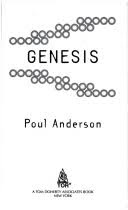Genesis, PART ONE, V.
Reading has become anachronistic. Laurinda Ashcroft, a human-AI interface, reads to preserve her humanity and feels close to:
Hamlet
Anne Elliot
Wilkins Micawber
Vidal Benzaguen
Genesis reads like a culmination of earlier speculative fiction:
Frankenstein, about the scientific creation of human life;
The Time Machine, insofar as that work addresses the ultimate degeneration of humanity and the end of life on Earth;
Olaf Stapledon's cosmic sf;
Asimov's robotics and AI.

15 comments:
Kaor, Paul!
I would say GENESIS owns more, conceptually, to Olaf Stapledon and Asimov's robot. The humans "recreated" by Gaia were not like the monster in FRANKENSTEIN.
Ad astra! Sean
Sean,
But there is the same issue of whether it is right to create beings that will suffer.
Paul.
Telling and hearing stories is fundamental to humane existence -- it's how we ascribe meaning to "one damned thing after another". Exactly how we do it is culturally contingent, but the general phenomenon isn't.
Kaor, Paul and Mr. Stirling!
Paul: But the humans in Gaia's "simulations," however realistic they seemed, were not REAL. Unlike the actual humans that AI brought back from extinction by using stored genetic material.
Mr. Stirling: I agree, the great epic poems are examples of that. Such as the works of Homer, Virgil, BEOWULF, THE SONG OF ROLAND, Dante's DIVINE COMEDY, etc.
Ad astra! Sean
Sean,
I agree that a simulated entity is not a real entity but Gaia's internal creations are self-conscious and are therefore called "emulations" to differentiate them from simulations.
Paul.
Kaor, Paul!
I erred here, the term used in GENESIS was "emulations," not "simulations." But, these emulations still don't seem REAL to me. How could they, if the "persons" within the emulations were only temporary "spinoffs" of Gaia in scenarios that were not physically REAL?
The emulated "persons" created by Gaia were not physically real and lasted only as long as the scenarios they were in had not been "switched off" by the AI.
Is this a failure of imagination on my part or a difference of interpretations?
Ad astra! Sean
Sean,
A difference of interpretations. Gaia is a conscious intelligence. The emulated persons are self-conscious parts of herself, therefore real to themselves. They believe that they inhabit a physical universe. They experience sensations, emotions, pleasures and pains. When Christian and Laurinda are interacting with the emulations, they are as morally obliged to avoid causing suffering as if they were interacting with physical human beings.
Paul.
The term, "emulations," is used to differentiate these entities from unconscious simulations.
Kaor, Paul!
I do understand these points you made. I simply find it hard to think these temporarily self conscious PARTS of Gaia to be true persons. But for the sake of the
the story I realize I have to accept that and agree with your conclusions.
Anderson was certainly going beyond his previous achievements with GENESIS and THE HARVEST OF STARS books!
Ad astra! Sean
Sean,
Self-consciousness is personality and vice versa. Surely that is what these words mean?
I think that you find the idea of transient persons difficult because you believe or assume that each person has or is an immortal soul.
Paul.
Sean: the emulations in the recreated historical scenarios experience their environment precisely as a human in a normal body would... so then we run into the problem of distinguishing between a thing and a perfect copy of a thing.
Kaor, Paul and Mr. Stirling!
Paul: Not quite that. Merely the fact that these "emulations" existed only temporarily (and if "humans" with no actually physical bodies), in scenarios that could be switched off at any moment by Gaia. Given all that, I found it difficult to think of these "emulations" as real persons.
Mr. Stirling: could these copies even be perfect? When Gaia ran scenarios set in historical periods from the past, she or it had to depend on imperfect/incomplete knowledge of past times and persons to make those copies. Issues of this kind also leads to my skepticism about those "emulations."
Ad astra! Sean
Sean,
An emulation that is a transient self-consciousness is a transient person, not something other than a person.
The emulations are imperfect as copies but are still conscious.
Paul.
The precise details of history have vanished into the well of entropy; but precise information on how the human mind/body work are available to the AI. That's not really a valid comparison.
Kaor, Paul and Mr. Stirling!
Both: All this is moot if no AIs capable of creating "emulations" are ever made. Which means I think this is a question we cannot resolve.
Ad astra! Sean
Post a Comment